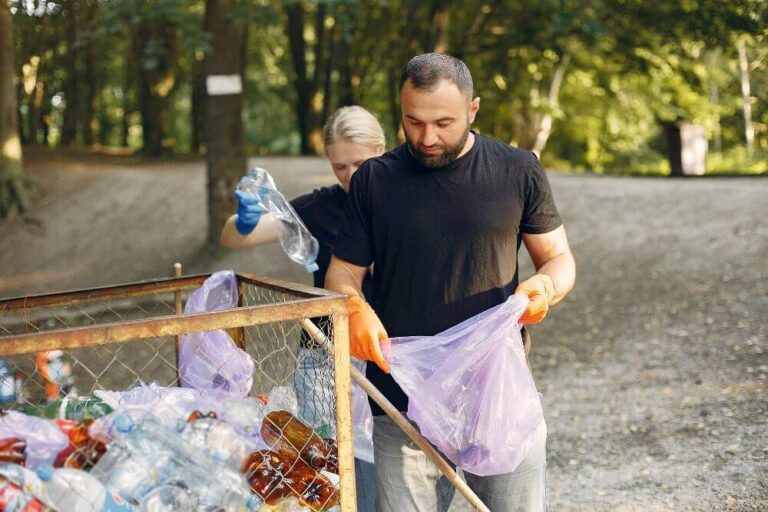Hosting an event is an exciting opportunity for businesses to connect with their audience and showcase their brand. However, once the event is over, managing the leftover waste can be a challenging task. From discarded food and packaging to decorations and equipment, the volume of waste generated can quickly become overwhelming. For businesses in Phoenix, AZ, effective waste management is particularly important due to local environmental regulations and the city’s focus on sustainability.
Large-scale events, whether they are trade shows, corporate gatherings, or community festivals, produce various types of waste. Businesses must find practical ways to manage bulk waste efficiently while minimizing environmental impact.
Understanding Waste Management Needs After an Event
To handle post-event waste effectively, it’s crucial to assess the specific needs of your cleanup. The type of waste generated will often depend on the nature of the event. For instance, food waste is common at catering-heavy events, while packaging and promotional materials are typical for trade shows. Temporary setups, such as stages or tents, may leave behind construction debris.
Identifying the types and volume of waste helps businesses determine the best disposal strategy. For example, recyclable materials like cardboard or plastic can often be diverted from landfills, while general trash might require larger disposal methods. Understanding these needs streamlines the process and also reduces the risk of non-compliance with local regulations.
Using Dumpster Rentals for Efficient Waste Disposal
For businesses dealing with large amounts of post-event waste, dumpster rentals are an effective solution. These services provide designated containers that can accommodate substantial volumes of trash, making the cleanup process faster and more organized. In a busy city like Phoenix, where events are frequent, dumpster rental services are readily available to meet the demands of local businesses.
For businesses dealing with significant waste after events, dumpster rental in Phoenix, AZ, provides a practical solution, offering flexible sizes and easy disposal options tailored to your needs. These services allow businesses to focus on other aspects of the post-event process while leaving waste management in the hands of professionals.
Sorting Waste for Recycling and Disposal
Once the event is over and the cleanup begins, proper sorting of waste is essential. Separating recyclable materials from general trash helps reduce environmental impact and can even lower disposal costs. Common recyclables include cardboard, plastic bottles, aluminum cans, and glass containers. Setting up designated bins for these materials during the event can make sorting easier during the cleanup phase.
Food waste is another significant category. While it cannot always be recycled, composting may be an option depending on local facilities and partnerships. Leftover food in good condition can sometimes be donated to local shelters or food banks, reducing waste while supporting the community.
When renting dumpsters, many companies offer specific containers for recyclables, making it easier to manage waste separation. This approach streamlines the disposal process and supports sustainable practices. Educating event staff or volunteers on proper sorting methods before the event begins can save time during cleanup.
Benefits of Planning Ahead for Waste Management
Effective waste management starts long before the event itself. Pre-planning for bulk waste disposal allows businesses to address potential challenges and avoid unnecessary complications. Start by estimating the types and quantities of waste the event will generate. This assessment helps in determining the right number and size of dumpsters required.
Collaborating with a dumpster rental company before the event can help place the containers in convenient locations, such as near food stations or behind the venue. Strategic placement minimizes the effort needed to move waste, reducing cleanup time.
Additionally, working with local waste management services helps businesses stay compliant with city regulations. By planning ahead, businesses can focus more on delivering a successful event and less on handling logistics during the aftermath.
Advance planning also provides an opportunity to integrate sustainable practices into the event. Businesses can coordinate with vendors and suppliers to reduce waste generation by choosing eco-friendly packaging and reusable materials. Having a clear waste management plan can also create a positive impression on attendees, showcasing the company’s commitment to environmental responsibility. Thoughtful preparation makes sure that waste is handled efficiently and aligns with broader sustainability goals.
Handling Hazardous Waste and Special Items
Not all waste can go directly into a dumpster. Hazardous materials, such as batteries, electronics, or cleaning chemicals, require special handling to avoid fines or environmental harm. Businesses must identify these items and arrange for proper disposal methods.
If your event includes promotional giveaways or equipment that could be considered electronic waste, make arrangements with specialized recycling facilities. Some dumpster rental companies offer guidance or additional services for handling hazardous materials, making the process safer and more efficient.
Furniture, signage, or other large items left over after the event may also need special attention. These items might not fit into standard dumpsters and could require separate removal services. Planning for these materials in advance helps avoid delays during the cleanup process.
Cost-Effective Waste Management Tips
Managing waste after an event doesn’t have to strain your budget. Choosing the right dumpster sizes can prevent overpaying for unnecessary capacity. Compare prices from multiple providers to find competitive rates that align with your needs.
Reducing waste generation during the event can also lower costs. Opt for reusable decorations and digital options for promotional materials instead of printed flyers. Encourage vendors and participants to follow sustainable practices, which can lead to less waste overall.
Efficient waste management saves both time and money, making it easier for businesses to handle post-event responsibilities without stress.
Proper waste management after an event is a critical part of maintaining a business’s reputation and supporting community sustainability efforts. By sorting waste carefully, planning ahead, and collaborating with reliable local services, businesses can tackle bulk waste efficiently and responsibly. Taking these steps simplifies the cleanup process and reflects positively on the organization’s commitment to professionalism and environmental stewardship.


